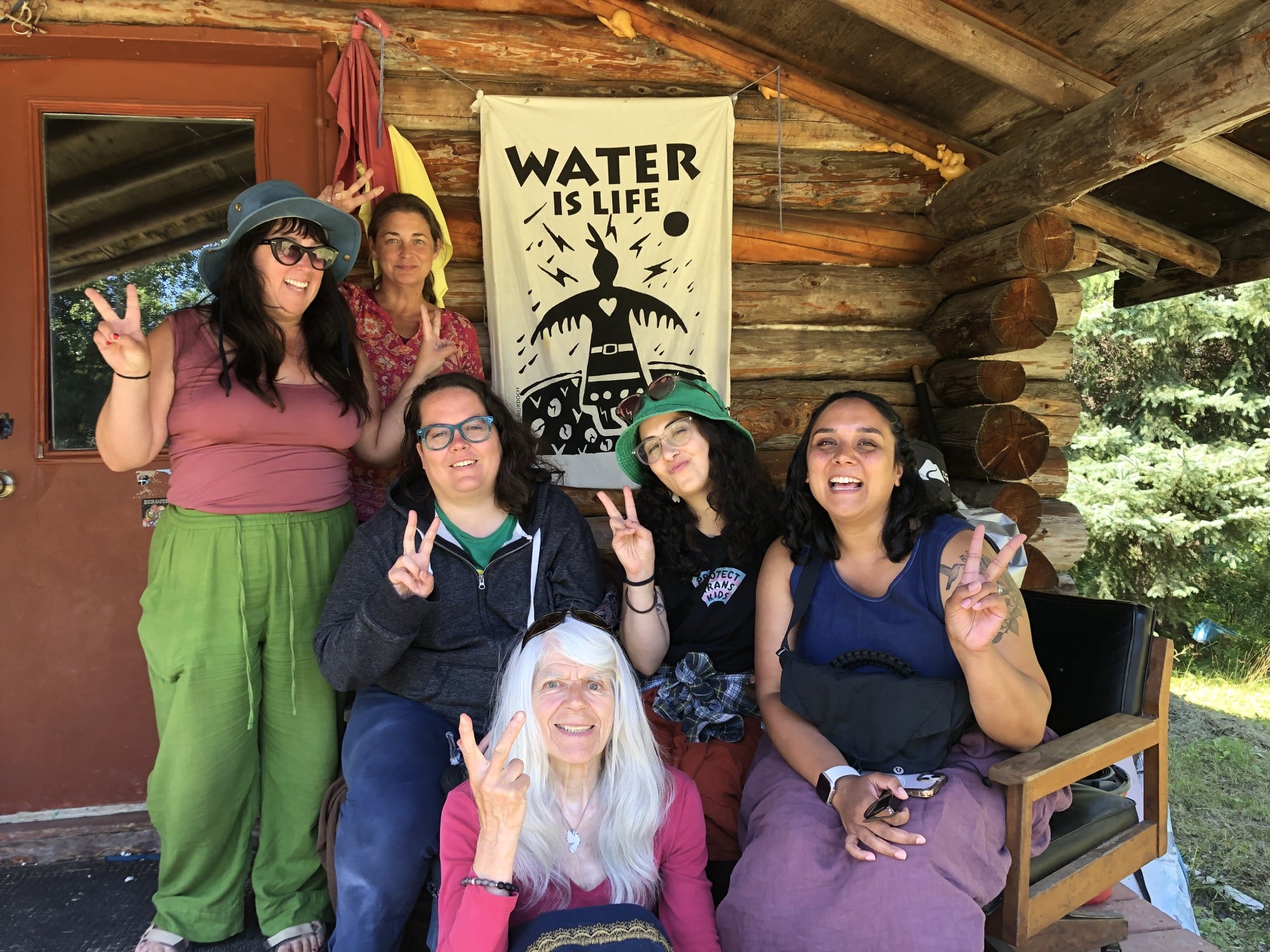In the winter of 2018, due to budgetary constraints, it was with profound grief and sadness that CPT cut its full time Indigenous People’s Solidarity Program. Yet CPTers in the organization were committed and dedicated to making sure that our Indigenous solidarity work continued. In 2019 we launched the Turtle Island Solidarity Network (TISN), composed of the Canada/TISN Coordinator and reservists across Turtle Island. Through TISN we have been able to provide accompaniment to land defenders and water protectors at Land Back Lane, Gidimt’en Camp and the Unist’ot’en Healing Centre, Grassy Narrows, and Oak Flat, as well as people in Toronto fighting for housing justice. We have reached beyond CPT’s membership to work alongside allied organizations, sharing resources, relationships and skills. It has been a labour of love.
Through this labour, one challenge has been sustaining delegations. Organizing and leading delegations without a full-time team to do the work has not been easy. The pandemic naturally suspended delegations from 2020 to 2022. However, since 2023 we have hosted three delegations and look forward to more.
Delegations are beautiful and hard. They are a jigsaw puzzle of logistics, last minute pivots, group dynamics, and profound learning all supported by a modest budget. The TISN delegation that took place in August was no exception as together we embarked on a journey to unmask and dismantle settler colonialism. With our limited capacity, organization can be a little difficult. Yet as we already know from movements fighting for decolonization and abolition, this work takes a community. Without our community, we could not have hosted such a beautiful delegation.
As we work towards building communities of peacemaking, we need authentic relationship building and vulnerability. To be honest, I don’t enjoy being vulnerable and I really don’t enjoy asking for help and relying on people. Whether it’s a result of trauma in my life, my upbringing in a capitalist/individualist society, or just my personality, I often prefer to accomplish things on my own. Yet this is antithetical to building communities of resistance. In planning a delegation, I am forced outside of my comfort zone. I have to ask for help, rely on my community, accept support, and trust that others’ contributions will lead to the success of the delegation. My community of support is broadly defined and includes current and former CPTers, donors, partners, family members, and fellow organizers in Toronto. It is a spider web of connection.
The meetings we had with partners were a result of decades of relationship building that CPT has done on the ground. Some of these relationships were cultivated by CPTers I have never met. It is a gift to be invited to step into these relationships because of the organization I work for. It is always an honour to listen to Judy DaSilva talk about when CPT first came to Grassy Narrows to assess what support we could offer. Over twenty years later, we still support as we can, and we are blessed to receive Judy’s teachings.
Our meetings in Winnipeg come from more recent relationships. In 2021, two CPTers walked with Mama Bear Clan, which runs out of the North Point Douglas Women’s Center. Connections made by a CPTer’s family member in Winnipeg led to our delegations learning from Sean Oliver about Métis historical and present resistance in Winnipeg, and joining Sabu’s Cubs street patrol. We were also able to meet with Clayton Thomas-Müller, a Cree writer and activist, thanks to a meeting in Toronto at protests against the Prospectors & Developers Association of Canada international mining conference, organized by close CPT ally the Mining Injustice Solidarity Network. It is this broader community that extends our justice work.
It wasn’t just the meetings that were a sign of community work. Our basic needs for food and accommodation were provided by our community in Winnipeg. With delegates coming from across Turtle Island by plane, packing sleeping bags and mats was difficult. It took a quick email to our community in Winnipeg to find these necessities for our group. When we needed a place for lodging, Home Street Mennonite Church once again provided us a safe place to rest our heads. Members of Home Street and Hope Mennonite Churches provided our delegation with meals. A day before the delegation was set to start, it seemed that camping might be part of our trip, and again, our friends at Home Street, Hope and First Mennonite Churches assured me that they could find us tents and that any pivot our delegation needed to take, would be supported. We were not alone.
Our delegates have gone home with stories of peacemaking from a week of intense listening, learning, and shared living. When I take a step back, I see a much broader story of peacemaking and community building that makes TISN delegations possible in the first place. More than that, our reliance on community and on relationships is how peacemaking happens. Our connections strengthen the web of human solidarity, bring us closer together, and build the trust we need to resist oppression together and work for justice.




